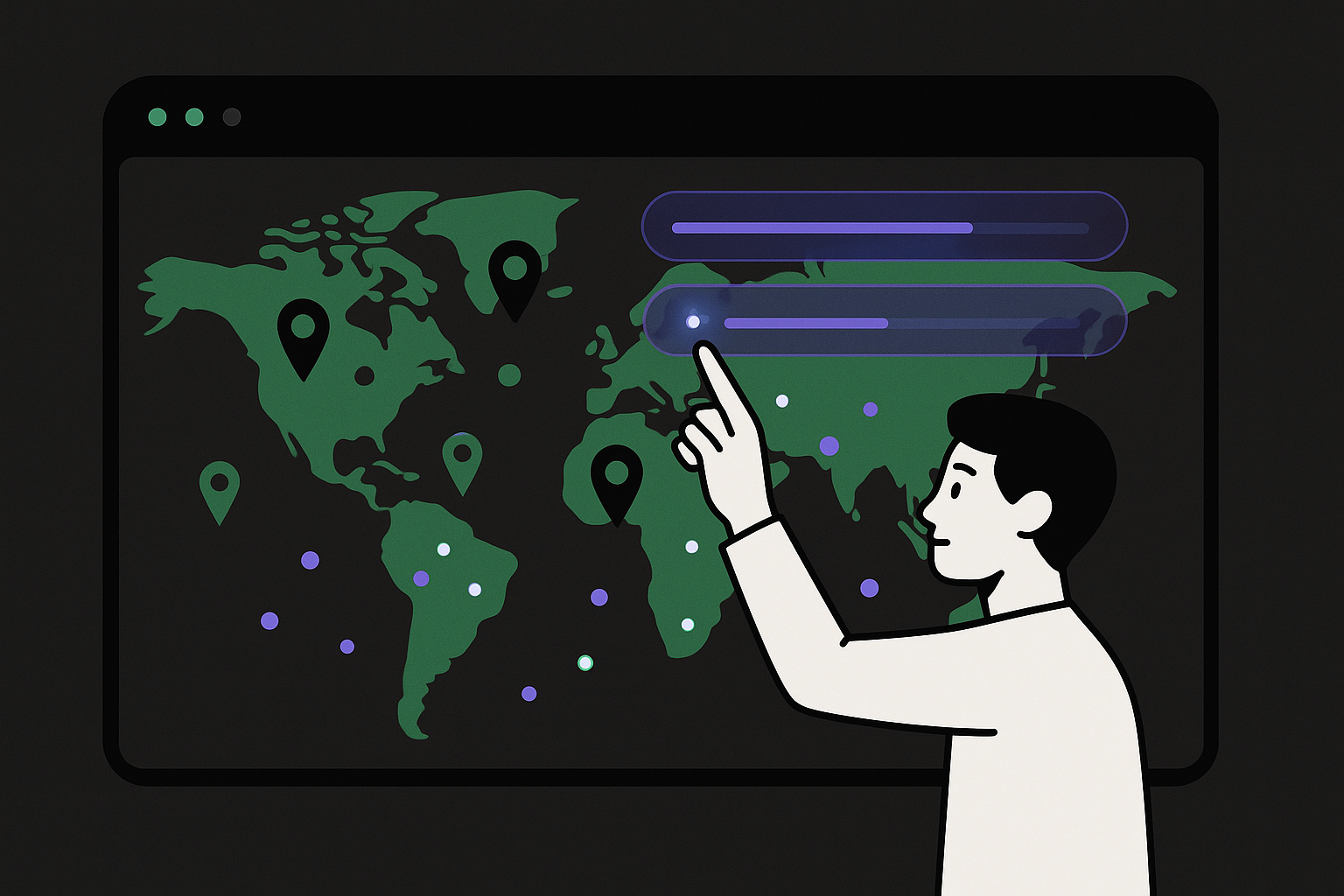How easily are people finding you online through a Google search?
How about through a ChatGPT search?
Your brand’s online visibility is essential for paving the way for brand awareness and discoverability.
Traditionally, this has always required Search Engine Optimisation (SEO) to optimise your website and its content in order to rank higher on Google. Since the higher you rank on Google, the easier it is for users to find you.
And while Google is still very much the top search engine for users, as ChatGPT search volume is only approximately 0.5% of the size of Google searches per day, AI searches are nevertheless on the rise and it’s important we optimise for both AI and traditional searches.
SEO Has Evolved
How users are searching and finding what they need is rapidly changing with the rise of AI, meaning SEO is continuously evolving.
Prior to the rise of AI, visibility meant ensuring your website ticked the right boxes; optimised titles, meta descriptions, backlinks, relevant blog posts and keywords that aligned with what people search for in Google.
By ticking off those traditional SEO boxes, over time you would climb search rankings and could rank higher on Google than your competitors. However, the way people search and the way in which Google understands those searches has changed dramatically, meaning that the traditional SEO approach has had to evolve too.
More and more users utilise AI as search engines, which has meant that these platforms don’t simply match keywords, they seek to understand user intent. Therefore your brand’s visibility is no longer just about technical SEO, it’s now also about trust, authority, and human relevance.
Key Considerations for AI Visibility
Trust signals are the primary way in which Google, ChatGPT and Gemini are deciding which brands deserve visibility.
What are these trust signals you may be wondering?
1. Human-First Content
Ensuring your copy and content is written for people first and foremost, over algorithms. This includes ensuring your copy:
- Sounds like you
- Communicates your purpose (not just your offers)
- Is optimised to create value rather than just to sell
The goal is to create conversations that build trust with your audience, which will ultimately be picked up on by AI.
2. Experience, Expertise, Authority and Trust
Another layer of trust signals that AI are utilising to determine whether or not your brand deserves visibility is your reputation, credibility and authenticity.
Ways to do so includes:
- Showcasing real expertise through case studies, founder stories, behind-the-scenes content
- Building authority data-backed content, credible backlines and consistent messaging
- Reinforcing trust through transparent storytelling, social proof, and ethical marketing practices
3. Search Intent Mapping
Previously, SEO was all about finding the right keywords. Now, we need to actually understand why someone’s searching in the first place…and then build content around this intent. This includes the emotion, motivation, or question behind every query.
It’s important to analyse how your customers speak, identify how you may need to tailor your message to meet your customers where they are, and create content that answers real questions clearly.
When your content aligns with customer intent, AI will push you out to the people searching.
Being Found Beyond Google
AI tools like ChatGPT, Gemini, Google’s Search Generative Experience and Perplexity, are now reshaping the way people are discovering your brand. Rather than typing keywords into a search bar, users are asking AI questions in full sentences, and are being met with direct, summarised responses.
In these AI-driven ecosystems, the content that AI pushes to users usually comes from trusted, high-authority sources. Meaning that if your brand isn’t clearly defined, consistent and discoverable, it may result in AI not recommending you to users. AI tools will seek to learn from everything you put online; including your website, its content, the structure, your reviews, and FAQs.
Tips to enhance your visibility for AI-powered search:
- Optimise for “conversational search”: Write how people actually speak; questions, answers and natural phrasing help AI models understand your relevance.
- Create content that answers, rather than just promotes: FAQS, FAQ-style blogs, how-to-guides, and value-led content.
- Use structured data: Schema markup and clear metadata will make it easier for AI to identify your brand as a credible source.
- Be consistent across the board: AI tools look beyond your website, they also reference your social media, reviews and third-party listings.
Another way of thinking about the evolution of SEO in terms of AI visibility is that the goal is to become credible and trusted enough to AI to be included in the conversations that will help drive users’ decisions.
Omni’s GEO Checklist
At Omni, when we conduct GEO Visibility audits, we assess how findable, credible, and trustworthy your brand appears across both human searches and AI-driven recommendations.
Here are the five key measurements we use to determine your overall GEO score:
1. Can AI find you?
If someone asked ChatGPT, “Who are the best [your industry] brands in Australia?”, would your name appear?
This is where we analyse which search queries and AI prompts your brand performs well in, and where visibility drops off.
2. Who talks about you?
We assess where your brand is being mentioned online; in articles, reviews, directories, or partner sites, and how those mentions shape your credibility.
The more diverse, reputable, and consistent those mentions are, the more confidence AI (and your audience) has in your brand’s legitimacy.
3. Can AI answer questions about you?
We test what happens when AI is asked questions about your brand specifically.
Can it describe who you are, what you offer, where you’re based, or what you stand for?
4. How machine-readable are you?
Your content may be beautifully written for humans, but can machines actually read it? We assess how well your website and listings use structured data, schema markup, and metadata, all of which help AI tools “understand” who you are.
5. What’s your reputation?
AI pulls data from reviews, ratings, testimonials, and user sentiment to determine whether your business is credible enough to recommend.
We measure how consistently you’re reviewed, how you respond to feedback, and how your tone reflects your values.
GEO and Local Presence
AI tools personalise their responses based on behaviour, intent and location signals. Meaning that your discoverability through AI recommendations (as well as the traditional local search) is influenced by optimising your local presence.
Local Presence
Your Google Business Profile has always been essential for SEO, and is just as important from a GEO perspective. To ensure you’re using Google Business Profile as an effective visibility tool, ensure you:
- Fill out every section completely
- Regularly update photos
- Post updates, offers, and blogs, like you would on social media
- Ensure your name, address, and phone number is consistent across all platforms
- Respond to every review whether they’re good or bad, as engagement signals activity, which signals trust
Utilise GEO-Intent Keywords
Generally when users search with intent, location is weaved in; for example “eco-friendly jewellery Sydney”.
To appear in those searches:
- Include natural, location-based terms throughout your website copy
- Create region-specific landing pages for key markets where relevant
- Mention local landmarks, climates, or cultural touchpoints where relevant, such as “Shop Australian-made sustainable skincare, formulated for our warm Aussie climate”
Encourage Reviews and Community Engagement
Customer feedback is one of the strongest drivers of visibility, so it’s important to encourage qualitative reviews from customers. In doing so, you’ll be boosting both local rankings, and allowing AI to view your brand as more credible.
Create Content for AI-Powered Local Search
To be included in recommendation-style answers to location-based questions, we recommend:
- Keep your content structured and factually clear
- Ensure your About page and contact details clearly state your location
- Publish FAQ-style content answering region-specific questions
Final Thoughts
In the age of AI searches, it’s essential that you begin implementing GEO strategies to become visible and recommended by AI to users. Since AI doesn’t just find brands based on keywords, it chooses to recommend the ones that it deems trustworthy, authentic, reputable, and written for humans to create value.
In other words, AI doesn’t reward noise. It rewards clarity, authority, and reputation. Ready to make your brand tone one AI cannot ignore? Omni Online is here to help, book your free Digital Alignment Audit now.








